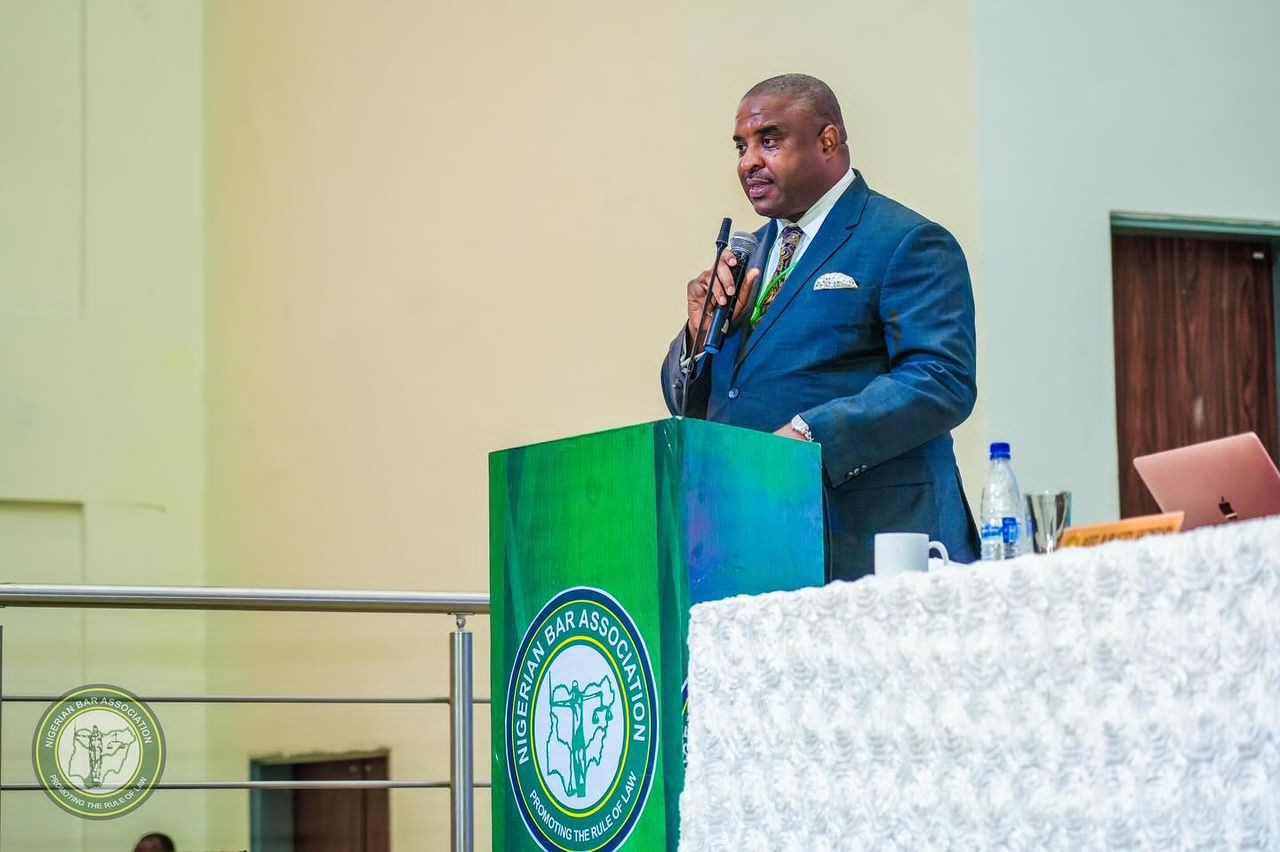In a compelling session, Chairman of the Governing Board of the NBA-ICLE and leading NBA Presidential Candidate, Tobenna Erojikwe, delivered a thought-provoking keynote speech at the Nigerian Bar Association’s (NBA) Kaduna Branch’s Law Week. Speaking on the theme “Rethinking Legal Practice in Today’s World,” Erojikwe challenged the status quo and called for a fundamental reimagining of the legal profession in Nigeria.
The event, which drew attendees from across the state and beyond, provided a platform for critical discourse on the future of legal practice in the country. Erojikwe’s address touched on several key areas, including the need for mindset reorientation, structural reforms, and the impact of globalisation and technology on the profession.
Opening his remarks, Erojikwe congratulated the Kaduna Branch on organising the Law Week, commending their choice of topic as particularly timely. “A change of orientation and attitude is critical to creating the foundations for any new ideology,” he stated, setting the tone for his address. “We must interrogate the current state of play and then seek to redefine our ethos and our world view corporately as a profession and then as individuals.”
The speaker emphasised the significance of the word “rethinking” in the event’s theme, suggesting that it points to a pressing need for a new ideology, philosophy, approach, and orientation within the legal profession. He posed a challenging question to the audience: “Fundamentally, we must consider whether we live up to the standards that we set for ourselves and the expectations of society.”
Erojikwe delved into the core of the legal profession’s identity, reminding attendees of their motto: the promotion of the rule of law. He urged his colleagues to reflect deeply on whether they are still living up to this billing, stating, “It is critical that we reflect on this particular issue because it is at the core of who we are.”
The keynote address outlined four main areas for consideration in the rethinking process: philosophical and ideological perspectives, structural and administrative frameworks, institutional frameworks for career advancement, and the role of individual lawyers.
Erojikwe didn’t shy away from addressing the challenges facing the profession. He painted a sobering picture of the current state of legal practice in Nigeria, highlighting issues such as:
1. The predominance of litigation-based practice
2. The financial struggles faced by many lawyers
3. Challenges posed by globalisation and liberalisation
4. The impact of rapidly advancing technology on legal services
The speaker also touched on concerns regarding judicial appointments and the overall governance of the profession. He posed a poignant question to his colleagues: “For a profession that has been invested in enormously, how have we fared?”
Erojikwe’s call for mindset reorientation resonated strongly with the audience. He argued that this shift in thinking should be the first and most crucial step in rethinking legal practice. “The first and most important rethink, I think, must be a mindset reorientation,” he asserted.
The address was not merely a critique of the current state of affairs but also a rallying cry for positive change. Erojikwe emphasised the need for the legal profession to adapt to the changing global landscape, embrace technology, and find innovative ways to overcome financial challenges.
The NBA Kaduna Law Week has set a new benchmark for professional discourse in the Nigerian legal community. With its thought-provoking theme and Erojikwe’s challenging keynote address, the event has ignited a crucial conversation about the future of legal practice in the country.
As the legal profession in Nigeria stands at this crossroads, the ideas shared at this event may well shape the direction of legal practice for years to come. The call for rethinking and reimagining has been made; now, it falls to the members of the profession to take up this challenge and forge a new path forward.
Erojikwe’s comprehensive address covered various aspects of the legal profession, from its philosophical underpinnings to the practical challenges faced by practitioners. He stressed the importance of a holistic approach to reform, stating, “We will consider the theme of Law Week from a philosophical and ideological perspective because that is at the very base of who we are as a group of people.”
The speaker also highlighted the need for introspection and self-assessment within the profession. He urged his colleagues to critically examine their role and impact, asking, “Have we lived up to the standard that we have set for ourselves as a profession?”
Throughout his address, Erojikwe emphasised the interconnected nature of the challenges facing the legal profession in Nigeria. He argued that addressing these issues would require a coordinated effort, touching on structural, governance, and administrative frameworks as well as institutional frameworks for career advancement and progression.
The Law Week event, with its focus on rethinking legal practice, has sparked a broader conversation within the Nigerian legal community about the future of the profession. As practitioners grapple with the ideas presented by Erojikwe, there is a growing recognition of the need for innovation and adaptation in the face of global changes and technological advancements.
As the event concluded, there was a sense that the Nigerian legal profession stood at a crucial juncture. The challenges outlined by Erojikwe are significant, but so are the opportunities for positive change and growth. The coming months and years will likely see continued debate and discussion as the profession seeks to redefine itself for the modern era.




